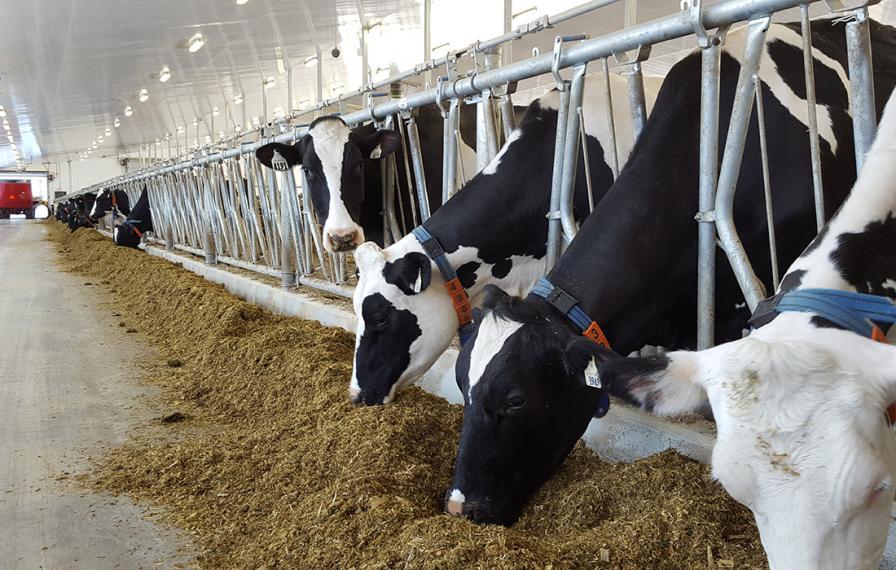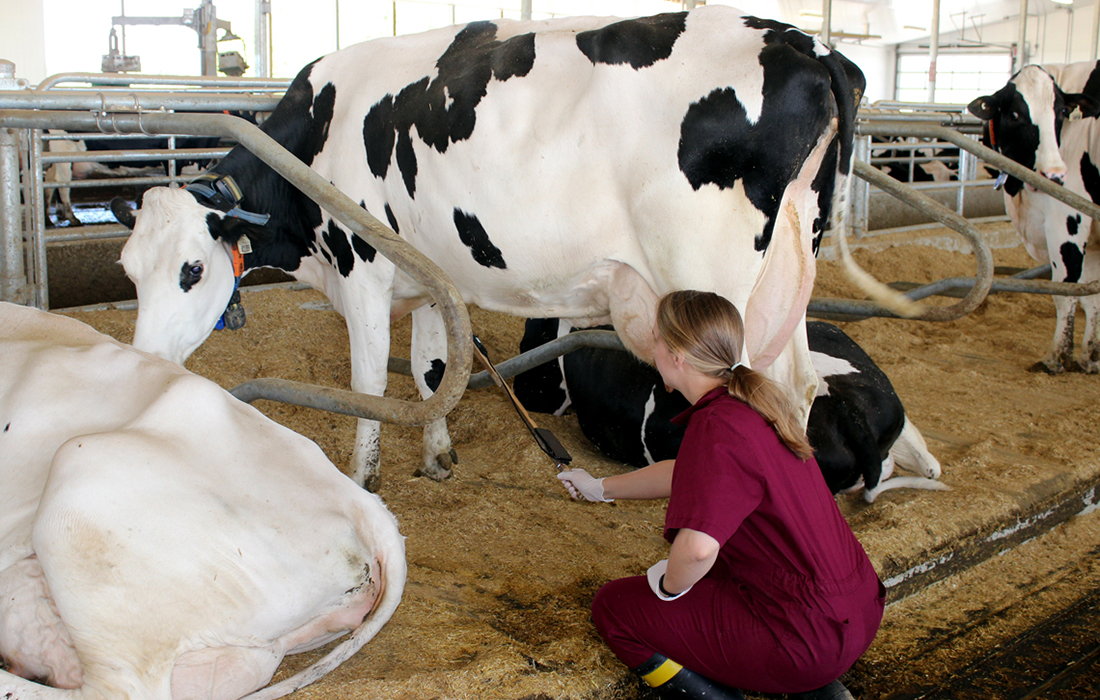Making better milk through cow behaviour

What if dairy farmers could improve their cows’ health and enhance milk’s nutritional quality through understanding their animals’ feeding behaviour?
That’s what University of Guelph researcher Trevor DeVries is helping them do. He’s the Canada Research Chair in Dairy Cattle Behavior and Welfare and associate professor in the university’s animal biosciences department.
DeVries says through his research, he is focused on the factors that influence cows’ feeding behaviour “and the consequences of that behaviour.”
“We’re looking at how we can alter the way that cows consume their feed,” he adds “through dietary and feeding management manipulations, and through changes in housing or environmental conditions. We’re looking at how those factors influence how, when and what cows eat.”
His research, primarily funded by the Ontario Ministry of Agriculture, Food and Rural Affairs-University of Guelph Partnership, the Natural Sciences and Engineering Research Council of Canada, and the Dairy Farmers of Canada, looks at how cows’ feeding behaviour translate into milk production and quality. This includes how efficiently the milk is produced and milk quality, particularly nutritional composition.
DeVries has a longstanding interest in the feeding behaviour of cattle “and looking at it from a variety of different angles,” and shares this interest with his students.
Graduate students working toward their master’s or PhD degrees with DeVries lead all of his research projects.
“In leading the various research projects, they’re gaining the experience and knowledge in this field of study and that’s really setting them up to go on to work directly in the dairy industry,” he explains. Former students have obtained jobs as dairy cattle nutritionists, on-farm consultants, animal care policy advisers, along with teachers and researchers in colleges and universities.

Animal welfare benefits of the research
DeVries’ work has tremendous animal welfare benefits. He says researchers typically think about animal welfare in three areas:
- Animal health and production
- Animal affective state (pain, pleasure, distress)
- Animal ability to express natural behaviour
“A lot of our research is definitely focused on looking to try and identify intake patterns that are conducive to good health, behaviour and also production,” he explains.
In a nutshell, DeVries says he and his research team are striving to identify feeding, nutritional and housing practices that contribute to top-notch milk production and animal health. They are also always considering “what’s good from the animal’s perspective – what they are motivated to do from a behavioural perspective.”
The idea is to highlight practices that are beneficial for both dairy farmers and milk product consumers. For dairy farmers, this means practices that are good from a production and cow health standpoint.
“If we do that, we’re going to make milk efficiently and we’re going to reduce the costs associated with cows’ health concerns,” he says, noting that this should have a positive impact on the dairy industry.
At the same time, “we’re also trying to identify factors that are good for the cow’s welfare, which we know is playing a larger role in terms of the consumer’s perception of food animal products,” he says.
By promoting practices that are good for cow health and welfare, “we are then helping to satisfy consumers’ concerns about the ethical treatment of food production animals.”
How farmers can use DeVries’ research
Through his work, DeVries says he’s evaluating very practical management practices on farms, such as identifying various nutritional programs, feeding and housing management programs.
“We can directly recommend to dairy producers which ones to utilize on farms,” he notes.
Shelley Crabtree, Dairy Research Cluster communications specialist, says DeVries’ scientific findings on feeding behaviour and animal welfare have “contributed greatly” to Dairy Farmers of Canada’s development of the animal care assessment program within its proAction Initiative. The entire initiative is designed to enable farmers to record and show Canadians they are implementing best practices on their farms in a number of areas, including milk quality, food safety, animal care, livestock traceability, biosecurity and environmental stewardship.
Animal care assessments are being done now across the country with the animal care and livestock traceability validations beginning in September.
DeVries also sits on the animal care technical committee that serves to advise Dairy Farmers of Canada on best practices that enables farmers to “continuously improve animal welfare,” she notes.
Sharing the research

DeVries communicates his findings in a number of different ways, including ensuring his work is peer-reviewed and published in scientific journals.
Furthermore, he regularly writes articles for dairy publications, both local and those distributed in North America and worldwide.
He also presents his research findings to a variety of groups. On average, he gives extension-type presentations twice a month about his research to local, North American and global dairy-industry events and producer meetings.
An example of DeVries’ direct interaction with farmers was his role as the scientific expert in a three-part webinar series delivered last year to about 300 farmers across Canada. The webinar, delivered by Dairy Farmers of Canada and Valacta, a Quebec-based knowledge-transfer organization, was on animal comfort.
Crabtree says DeVries “put together a really good presentation on animal comfort in the barn and they covered various aspects of it in this three-part series,” adding that excels at those presentations into practical terms for farmers.”
The webinar is available online. Thousands of visitors have gone through the web pages and the accompanying documentation, she notes.